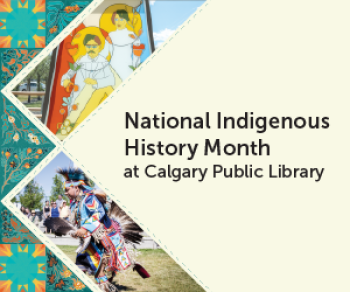National Indigenous History Month is a time to reflect, celebrate, and come together. Stories are shared, voices lifted, and community is at the heart. Everyone is welcome because the programs were made for you and are about you.
Every June at Calgary Public Library, the community comes together to celebrate National Indigenous History Month. What began as a week-long event has grown into a robust month filled with events, activities, and resources from the Library and partners.
Working with community members for events like National Indigenous History Month is a vital part of being authentic to the people the Library serves — it’s how we can share things directly from the root of the culture. It’s an honour to have a platform like the Library to share people being their authentic selves and to have a space to share who they are.
2025 National Indigenous History Month
From showcasing powwow dances and music, creating spaces for conversation, and celebrating the vast culture of Treaty 7, National Indigenous History Month has grown into one of Calgary Public Library's largest programs.
Programs throughout June include a film-screening of Singing Back the Buffalo, musical performances, and a showcase with the Library's Indigenous Artist in Residence.
On June 12, Canada’s Sports Hall of Fame will host an inspiring livestream. Olympic gold medalist and PWHL star Jocelyne Larocque and Chantal Larocque-Fritzsche, a Tom Longboat Award winner, will share stories of sport, identity, and representation. You can also attend this program in-person at Central Library.
A Journey of Growth
National Indigenous History Month and Indigenous Services at the Library didn't come to fruition overnight.
Calgary Public Library takes pride in being a place where everyone belongs. As a large organization that serves over 818,000 members, there is a responsibility to provide programs and services that reflect the diversity and scope of our community.
However, the Library hasn't always been a place where everyone felt welcome and there’s a lot of mistrust in Indigenous communities towards libraries. It took 104 years for Indigenous peoples from surrounding First Nations in Treaty 7 to get a Calgary Public Library card without paying the non-resident fee. That change only happened in 2016 — just two years before I started working at the Library.
Needless to say, there was lots of room for growth.
The Final Report of the Truth and Reconciliation Commission of Canada includes details on the history and legacy of Indian residential schools as well as 94 Calls to Action. Call to Action 69 specifically asks libraries, museums, and archives to reexamine their commitment to truth and reconciliation and commit more resources to sharing the true history of Indigenous peoples with our communities.
Since 2019, the Indigenous Services team has expanded and has played a vital role to help Indigenize the Library. We understand the importance of building relationships, meeting people where they are rather than having them come to you, recognizing and appreciating time with Elders, and demonstrating or bringing to action what is being taught. These principles are closely tied to the work we do when creating programs like National Indigenous History Month.
While there's still more work that needs to be done, it's exciting to see things start to progress.
Celebrating Treaty 7 Culture Year-round
We want everyone to feel like they belong at the Library. Beyond National Indigenous History Month, there are many programs and resources that can help you learn more about and stay connected to Treaty 7.
Libraries are places where people can access the information they need to learn more about themselves and the world around them. This means that it's important that libraries provide resources that share more about the culture and land we live on — for both Indigenous and non-Indigenous visitors.
Language and culture preservation is at the core of Indigenous Services at the Library. Services including the Elders’ Guidance Circle and Indigenous Languages Resource Centre help keep our community connected and provide opportunities for visitors to learn through the lived experiences and guidance from Elders.
The Library also showcases the beauty of Treaty 7 culture through Indigenous Placemaking installations. The initiative develops traditional and contemporary artworks that promote understanding of Indigenous peoples and cultures within Treaty 7. There are currently ten locations with Indigenous Placemaking installations, with more in the planning stages.
Visit calgarylibrary.ca/indigenous-services to view National Indigenous History Month programs and to learn more about Indigenous Services at the Library.
About the Author, Kelli Morning Bull
Kelli Morning Bull’s work at Calgary Public Library is shaped and made stronger by her lived experiences as a Blackfoot woman. As the Service Design Lead of Calgary Public Library’s Indigenous Services team, Kelli is helping the Library build relationships with Indigenous Elders and community groups, learn about Indigenous culture and protocol, and develop community-led programs and services for both Indigenous and non-Indigenous patrons. She brings a dynamic mix of culture, innovation, and creativity to one of the largest library systems in North America. In 2025, Kelli was recognized as a Mover & Shaker in Library Journal’s annual issue.

